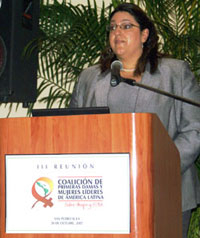News
HIV Epidemic in Latin America and the Caribbean Rooted in Gender Inequality, says Regional UNFPA Director
- 31 October 2007
News
SAN PEDRO SULA, Honduras — The feminization of the HIV epidemic in Latin America and the Caribbean finds its roots in the unequal power relations, discrimination and violence that women face, Marcela Suazo, regional director for UNFPA, the United Nations Population Fund, said during her speech at the third meeting of the Coalition of First Ladies and Women Leaders of Latin America on Women and AIDS.

She also said the role of alliances in responding to this situation is key, and presented the coalition as a good example: “This coalition can be a leading advocate for prevention, treatment, care and support of HIV/AIDS in the region, and can place the issue of women´s vulnerability and the feminization of the epidemic firmly on national and international agendas.”
| "We cannot wait for others to make the decisions that we should be making for ourselves." --Marcela Suazo
|
Ms. Suazo reminded the audience that while the previous meeting coalition meeting in Buenos Aires served to establish commitment and approve an important Platform of Action, it is now time to define the strategies required to overcome obstacles to implement this plan.
“We cannot wait for others to make the decisions that we should be making for ourselves,” Suazo said. She added that slowly but surely women have become participants in the response to the epidemic, rather than spectators.
In this context, gender inequality needs to be reduced through public policies aimed at empowering women and by introducing a gender perspective in national budgets. Ending gender-based violence should also be a priority, Ms. Suazo said.